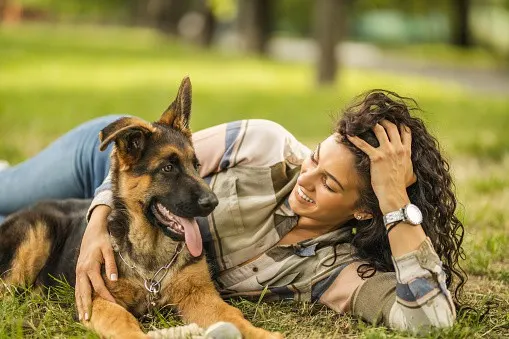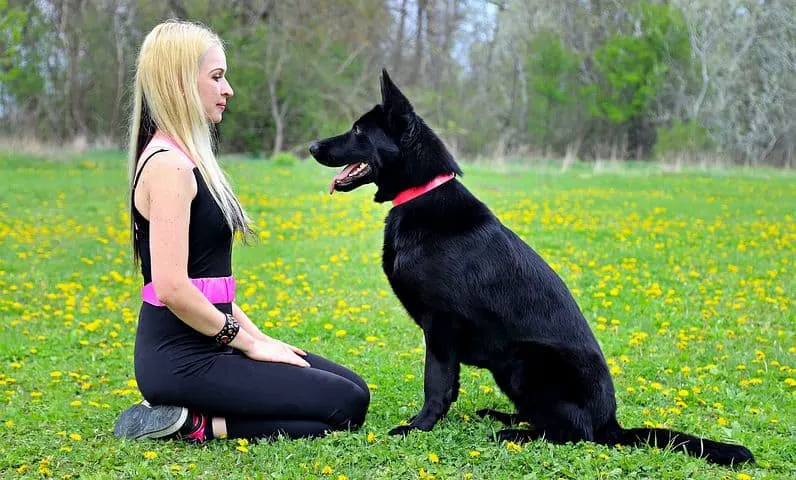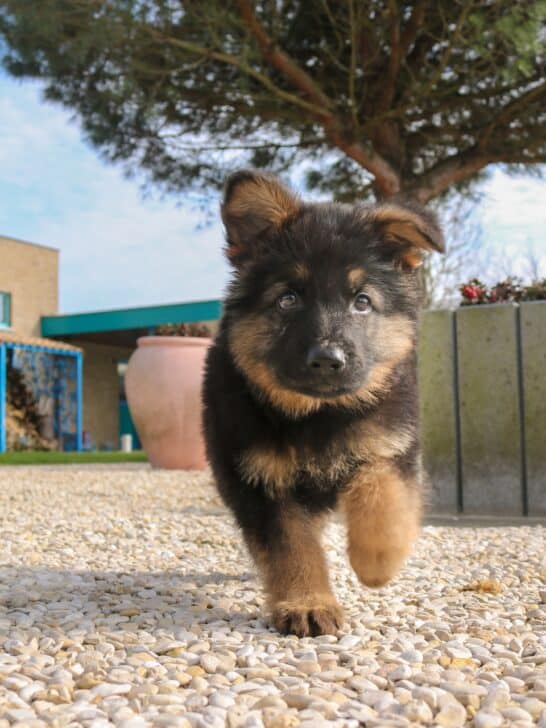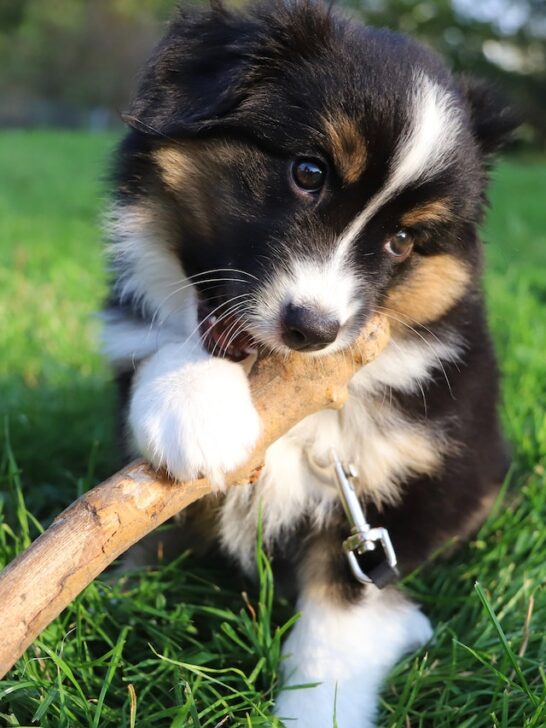Seeking Love and Loyalty? Get a German Shepherd
Ever since becoming increasingly popular in the US after making such a good impression on soldiers in WWII, German Shepherds’ loyalty cannot be questioned.
These dedicated working dogs helped American soldiers endure the rigors of battle, and although German Shepherds’ popularity has fluctuated over the decades, they are once again among the most popular dogs.
And for good reason. When canine experts are asked which dog breed is the most loyal, German Shepherds almost always top the list.
These dogs are intelligent, strong, loving, and loyal which helps explain their popularity with law enforcement, families, and even in helping the disabled.
The breed makes an excellent guard dog and loyal friend.
That said, German Shepherds require a committed owner who’s willing to train and guide them to be the best dog possible.

How Loyal Are German Shepherds?
German Shepherds are a product of their environment and training. With this breed, you get what you give.
Raising a German Shepherd is a significant undertaking and demands you jump in head first.
As with any breed, a dog’s temperament and personality traits are formed primarily by how they are raised, socialized, and trained.
However, dogs’ genes, breed, background, and the purpose that they were bred for will factor into their natural instincts and behavior as well.
So, the temperament of a German Shepherd does make the breed likely to be loyal with guidance.
If you want to build loyalty in your German Shepherd, it will take dedication and hard work. Frankly, no breed is “born loyal.”
You must have confidence and be willing to take a leadership role with a German Shepherd to build trust and gain admiration from them.
When your dog feels safe with you, he or she will trust you.
Building confidence in your German Shepherd will help them become socially competent, happy, and loyal.
German Shepherds that are treated with love, kindness, and discipline, and who are given a sense of purpose can they grow into one of the most wonderful dogs you will meet.
Conversely, when German Shepherds receive no training and live in an environment of neglect with no boundaries, the consequences can be dire.
These high-energy dogs can become aggressive, anxious in new situations, and respond violently to strangers.

What Are German Shepherds Like?
German Shepherds are one of the most intelligent, loyal, and obedient dog breeds in the world.
As puppies, their fluffy brown fur and unpredictable ears make them ridiculously cute.
As they come of age, German Shepherds grow handsome with pointed ears and a strong muzzle. They are a dog lover’s dog.
According to wagwalking.com while German Shepherds are predisposed to being loyal, like all dogs, they need to be trained to display their loyalty in inappropriate ways.
You can teach them to socialize with other people and dogs, but you must be dedicated and consistent.
While training your German Shepherd, stay aware of which behaviors you encourage. German Shepherds have a tendency to become overly protective.
Owners must encourage the dogs to set a healthy level of protection by observing how they show signs of loyalty.
For instance, a dog that exerts protectiveness when there is an actual threat to their owner but remains calm where there is no danger shows healthy protection.
On the other hand, if you are walking your German Shepherd and he pulls, growls, or attacks when you encounter a stranger, that behavior should be discouraged.
Please note: your dog can smell and feel your energy. If you are anxious, so are they!
If you feel nervous approaching a strange person or animal, your dog may interpret that nervousness as a reason to attack.
If your dog’s behavior causes you concern, visit your veterinarian for a consultation.
Why Do People Like German Shepherds?
During WWII, an American soldier rescued Rin Tin Tin from the battlefield. The soldier, Duncan, trained Rin Tin Tin to act in silent films.
Audiences loved Rin Tin Tin so much, that he became a source of income for Warner Bros.
Rumor has it that the company released one of the Rin Tin Tin movies every time they ran into money problems.
According to Mentalfloss.com, German Shepherds are considered the third smartest breed of dog.
To receive this designation, the breed must understand a new command after five repetitions and follow the first command 95 percent of the time.
That is the German Shepherd!
Another example of their intelligence and dedication to humans occurred in the mid-1980s when six German Shepherds starred in a play.
The dogs attended drama lessons in Holland where they were given treats as rewards for their actions.
Although the play was a dud, the story itself is pretty amazing.
How Do German Shepherds Act?
This dog breed is alert and eager to please.
According to the gsdc.org German Shepherds have a direct and fearless temperament.
However, their confidence and tendency to act aloof shows they are picky when it comes to choosing friends.
Because of their intense loyalty and obedience, German Shepherds nave earned the trust of the police, the blind, and the military.
They are obedient dogs who can be shaped by loving, attentive owners.
You may be asking, what makes German Shepherds stand out among other breeds?
German Shepherds are active working dogs.
They thrive on attention and affection from their owners and prefer keeping company with their family rather than being left alone.
They truly enjoy interacting with their family, and that relationship helps build their loyalty.

How are German Shepherds Working Dogs?
German Shepherds are eager to work and serve their owners, and other individuals who have gained their trust.
This breed is easy to train because they want to please their pack leader and will try hard to succeed.
As mentioned, they are very intelligent and are a strong breed.
That said, they need to be trained. German Shepherds need you to make time for them and be involved in their development.
Because German Shepherds are working dogs, they need to have a job and expel energy.
As long as you guide them, they will remain loyal and loving to their family members.
They also make dedicated service dogs. German Shepherds serve in different roles, such as law enforcement, seeing-eye dogs, and more.
Police dogs: German Shepherds can sniff out bombs, corpses, and even perform search and rescue.
The breed has a keen sense of smell and has a laser-like focus when given a task.
And because they are working dogs, they enjoy completing jobs for their humans.
Seeing-eye dogs: In the 1900s, female German Shepherds were trained to help visually impaired individuals in Switzerland.
Although the dogs were capable, their fierce loyalty could lead to aggression or erupt in a bad temper.
Labrador Retrievers superseded German Shepherds for this type of work. Both dogs serve in this role.
Herd dogs: German Shepherds protect animals as much as they protect their humans.
In decades past they worked as sheepherders and still do today.
They make good pack leaders, ensuring the sheep stay within the fence and refrain from eating precious crops.
German Shepherds were bred to herd and protect sheep in the late 1800s.
Obviously, this breed emerged in Germany, and the breed we see today is a descendant of a combination of German Shepherds bred by a man named Captain Max von Stephanitz.
Are German Shepherds Obedient?
Only poodles and border collies are more intelligent than German Shepherds.
That intelligence is only one facet of being able to train them.
Their loyalty blended with their desire to please their owner helps them follow their human’s instructions and learn quickly.
German Shepherds are naturally curious, which leads to their being alert and competent guard dogs.
In addition, mix that with their intelligence and obedience and you have one amazingly loyal dog.
As mentioned, this breed requires a lot of commitment from its owner, as well as plenty of daily exercises.
Please note: if you’re less than an active individual, you may want pass on bringing a German Shepherd into your home.
Their high intelligence and abundant energy mean they need to run and play games that will challenge them.
German Shepherds should exercise daily to keep them healthy and happy.
As mentioned, German Shepherds need guidance and discipline. You have to show them that you’re the boss.
Individuals with a timid personality who are unable to lay down the law, once again, the German Shepherd is probably the wrong dog breed for you.

What About Training a German Shepherd?
Slow and steady wins the race when training a German Shepherd.
Owning a loyal German Shepherd is a plus, however, their strong loyalty can turn to aggression.
When you take an untrained dog with unchanneled loyalty, you may end up with a fearful and aggressive monster.
German Shepherds love their families, and if they feel threatened they will react with full force.
If you feel your German Shepherd has violent tendencies, please visit your veterinarian and get some advice.
More than likely, the experts may suggest some gentle and consistent training.
These dogs should be socialized early and often—the more they come in contact with people the more comfortable and emotionally stable they will become.
Similar to a human child, German Shepherd puppies tend to look to their parent for guidance and social cues.
The dog has to learn to trust you through simple interaction.
And once the dog does trust you, he or she will be as obedient and loyal as they can. You will have a long and rewarding relationship.
According to many in the German Shepherd community, even the most loyal German Shepherds can turn aggressive when they have been rewarded for overly protective behavior.
For example, if they become anxious around strangers, especially ones that they feel are intruding on their home, they may attack.
While gaining a dog’s loyalty is invaluable, you must teach your German Shepherd to channel their energy in constructive ways.
Bonding With the Family
Similar to dogs used for herding livestock, German Shepherds are alert, active, and athletic.
The breed is durable and great outdoor dogs, making them an ideal breed for individuals who enjoy hiking, running and swimming.
German Shepherds are fearless and stubborn, making them excellent and reliable guard dogs.
German Shepherds bond with their family, especially the head of the household.
If they are well trained, they may be timid when introduced to someone new.
However, once they get to know that person, they become downright friendly.

Do German Shepherds Bond With More Than One Family Member?
German Shepherds seem to bond closely and show loyalty to the person who spends the most time with them–i.e., the person who feeds, trains and takes care of his or her needs.
They can share their loyalty, however.
For example, my black German Shepherd bonded early on with my daughter, and he prefers her to everyone in the family.
But when my daughter moved out, the dog bonded closely to me, and he has to be in whichever room I am in.
Another reason my dog bonded with me is that I am the person who walks him, takes him to the vet, and naps with him.
On walks, my dog only heels for me. In addition, he resists obeying the other members of my family.
German Shepherds tend to be most loyal to the person who gives them the most time and love.
In order for your family to gain trust from your German Shepherd, we recommend the following tips:
- Have Family Members Spend Time With Him or Her
- Have Family Members Feed Your GSD
- Include Your Family When You Train Your GSD
- Play Games That Include the Whole Family
German Shepherds are a dog lover’s dog.
They are intelligent dedicated workers that will provide you with love, loyalty, and protection.






























